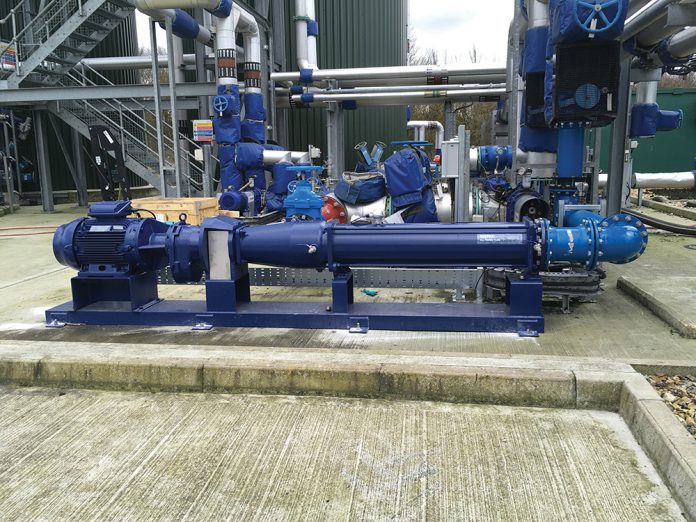Anglian Water has replaced lobe pumps at its Basildon HPH plant with progressive cavity (PC) pumps from SEEPEX, reducing equipment downtime, cutting maintenance costs and increasing biogas yields.
As the largest water and wastewater treatment company in the UK by geographical area, Anglian Water supplies water and recycling services to over six million domestic customers and processes over 150,000 tonnes of dry solid sewage sludge each year. It uses anaerobic digestion to generate energy from this sludge and, in a bid to further maximise energy production, the company has developed an innovative hydrolysis technology; the patented Heating, Pasteurisation, Hydrolysis (HPH) process. HPH conditions sewage sludge, creating higher quality biosolids for agriculture and generating 5% more biogas for energy generation by CHP engines. This energy reduces the operating costs of sludge treatment and cuts the plant’s carbon footprint.
Identifying underperformance
Anglian’s HPH process works by pumping thickened sludge at dry solids (ds) content of 4-8% through heat exchangers to raise the temperature to 42°C, before pasteurisation and subsequent cooling.
However, at Basildon WwTW, the original lobe pumps had a lower than expected flow rate and were unable to feed the heat exchanger efficiently when the ds were over 6%. This had a direct impact on the efficiency of the process and the final energy output of the system.
Lobe pumps have a clearance between the rotating lobes and the pump casing, resulting in ‘slip’ when pumping and a reduction in volumetric efficiency, particularly if there are product variations; for example, changes in viscosity or discharge pressure increases from downstream equipment such as heat exchangers. At the Basildon site, underperforming lobe pumps resulted in blockages in the heat exchanger, poor sludge mixing, variable sludge quality and a reduction in the expected biogas yield from the digesters.
The lobe pumps also required high levels of maintenance, as slip causes excessive wear on lobes and casing parts. Full maintenance interventions were required every three months, in addition to complete overhauls of the heat exchanger when blockages occurred. The cost of the overhauls alone was in excess of £40,000 per year.
A thorough approach
In order to solve these problems and restore efficiency, Anglian Water’s engineers approached SEEPEX with a request for reliable pump technology which would increase the thickened sludge throughput of the heat exchanger. After consultation with the client to fully understand the process and the pump performance required, SEEPEX carried out a series of elastomer immersion tests and analysed the results to determine the optimum stator material for the thickened sludge product and HPH process conditions. They subsequently recommended PC pumps which could deliver up to 198m3/hr through the heat exchanger to the digesters – even when faced with a variable sludge ds content.
Increasing efficiency and reliability
Unlike lobe pumps, PC pumps have an elastomer stator with a metal rotor. This provides an interference fit with no clearance along the sealing line, eliminating slip. Volumetric efficiency and flow rates are therefore unaffected by either viscosity, temperature or discharge pressure, while the lack of slip means that even when the ds% of the feed sludge varies, pump performance is maintained. Both the flow rate and discharge pressure are unaffected, ensuring optimum operational efficiency of both the pump and the heat exchanger.
Improvements in pump performance have resulted in more even heating of sludge to a higher temperature and a well-mixed, constant sludge feed for digestion, regardless of variable ds% inputs. These improvements have seen VFA (volatile fatty acids) increase by up to 100% compared to the lobe pumps. As VFA is an indicator of final gas yields, the new PC pumps from SEEPEX have increased energy production, as well as delivering a more reliable performance.
Significant cost savings
In the first 18 months of operation there have been no service interventions and the heat exchangers have experienced no blockages, reducing downtime and saving Anglian Water over £40,000 in maintenance costs. And with a payback of just one year, the SEEPEX PC pumps are already providing further tangible benefits to Anglian Water, including delivering a 400% longer service life than the previous lobe pumps; increased heat exchanger uptime; increased gas yield per litre of sludge; and increased throughput, resulting in more efficient energy production.
www.seepex.com



